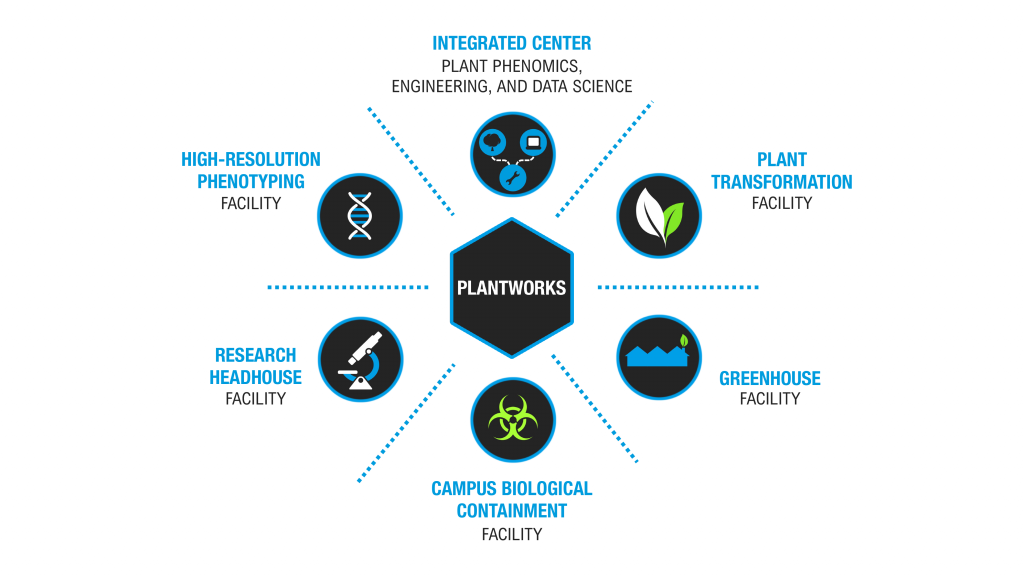
The Challenge
How can we leverage our well-established interdisciplinary research framework to discover and implement new methods for feeding the world sustainably, while simultaneously protecting and restoring our natural environments? And how can we meet this challenge in a way that is centered on teaching, training, and inspiring the next generation of plant science professionals?
The Idea
PlantWorks is a major infrastructure project, currently in the visioning stage, intended to radically upgrade Penn State’s capacities to conduct cutting-edge, interdisciplinary research in plant science. PlantWorks will serve as the epicenter for plant-reseated research at the university, integrating work at all scales, from basic cellular and molecular studies in our labs to commercial greenhouse environments at our Mendel’s way facility to field studies at scale under real world conditions at our Russell E. Larson Agricultural Research Center.
This generational transformation in Penn State’s capacity to address challenges feeding a growing population, restoring the environment, and adapting to a changing climate is rooted in the in the interdisciplinary strengths and vision of our research community at Penn State. Additionally, our vision is informed by our stakeholders in PA, the Northeast and around the world. Scientists who will contribute to and benefit from PlantWorks are located in departments across Penn State, including Agricultural Sciences, Entomology, Plant Biology, Engineering, Materials Science, Geosciences, Lanscape Architecture, Climatology Science, and Data Science.
The PlantWorks leadership team aims to establish the premier location, internationally, for research and education around crop resilience, food security, and related topics of vital importance on our increasingly climate-stressed planet.
The Components
- Greenhouse Facility: Specialized, state-of-the-art greenhouses that will enable customized conditions for CO2 level, light, temperature, and more
- High-Resolution Phenotyping Facility: Designed to allow for high- throughput capabilities, a space that will enable highly advanced, detailed structural analysis of large numbers of plants
- Plant Transformation Facility: Outfitted with new CRISPR technologies, a space purposed to develop transformation procedures for a wide range of plants, including major crops and species important to Mid-Atlantic forest environments
- Research Headhouse: A state-of-the-art facility designed for management and processing of large amounts of plant tissue for analysis
- Campus Biological Containment Facility: Will provide researchers with a secure environment for studying major pathogens and pests threatening agricultural and forest regions, so that they can proactively address new dangers brought about by climate change
- Integration Center: Will establish flexible facilities to accommodate plant phenomics, engineering, robotics, biosensors, and data science
As a well thought-out, fully integrated system, PlantWorks will leverage Penn State’s unique capabilities to move discoveries from the lab to the greenhouse to field work at our 2,200-acre Larson Research Farms just ten minutes from campus. The end goal is to fast-track our most transformational discoveries to achieve real-world, positive impact for our stakeholders throughout PA and across the globe.
The Scoping Study
Penn State has engaged national architectural firm Flad, a leader in the planning and design of academic and scientific facilities, to conduct a scoping study around the PlantWorks vision. This study is currently underway, and PlantWorks leadership continues to engage with members of the Penn State plant research community to ensure that their perspectives are captured and given careful consideration.
Members of the Penn State community with an interest in contributing to this process are invited to contact Troy Ott, acting director of the Huck Institutes of the Life Sciences.
Administration
At present, funding and administration of the PlantWorks effort is shared by Penn State’s Huck Institutes of the Life Sciences, College of Agricultural Sciences, and Eberly College of Science.
Contact
To learn more about the PlantWorks project, inquire about partnering opportunities, and share your needs as a member of the Penn State plant research community, please contact:
Mark Guiltinan
Director, Plant Institute; J. Franklin Styer Professor of Horticultural Botany; Professor of Plant Molecular Biology
